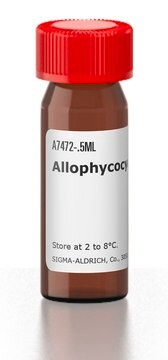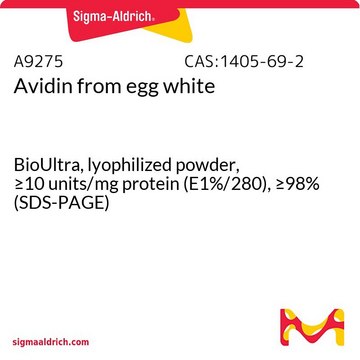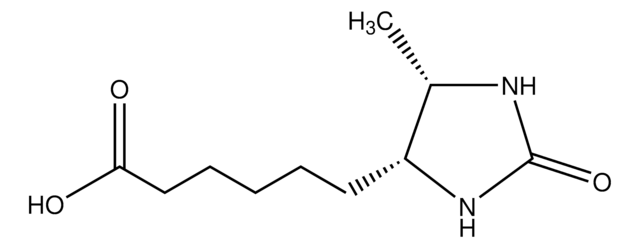B4501
Biotin
≥99% (HPLC), lyophilized powder
Synonym(s):
D-Biotin, Bios II, Coenzyme R, Vitamin B7, Vitamin H
About This Item
Recommended Products
biological source
synthetic (organic)
Quality Level
Assay
≥99% (HPLC)
form
lyophilized powder
technique(s)
HPLC: suitable
color
white to off-white
mp
231-233 °C (lit.)
solubility
ammonium hydroxide: 50 mg/mL (2 M)
storage temp.
2-8°C
SMILES string
[H][C@]12CS[C@@H](CCCCC(O)=O)[C@@]1([H])NC(=O)N2
InChI
1S/C10H16N2O3S/c13-8(14)4-2-1-3-7-9-6(5-16-7)11-10(15)12-9/h6-7,9H,1-5H2,(H,13,14)(H2,11,12,15)/t6-,7-,9-/m0/s1
InChI key
YBJHBAHKTGYVGT-ZKWXMUAHSA-N
Looking for similar products? Visit Product Comparison Guide
General description
Application
- for culturing of oligodendrocytes.
- as a vitamin supplement for the growth of Bacillus species.
- for blocking endogenous biotin during immunohistology procedures.
Biochem/physiol Actions
Other Notes
Application
comparable product
related product
Storage Class Code
11 - Combustible Solids
WGK
WGK 1
Flash Point(F)
Not applicable
Flash Point(C)
Not applicable
Personal Protective Equipment
Choose from one of the most recent versions:
Certificates of Analysis (COA)
Don't see the Right Version?
If you require a particular version, you can look up a specific certificate by the Lot or Batch number.
Already Own This Product?
Find documentation for the products that you have recently purchased in the Document Library.
Customers Also Viewed
Our team of scientists has experience in all areas of research including Life Science, Material Science, Chemical Synthesis, Chromatography, Analytical and many others.
Contact Technical Service







